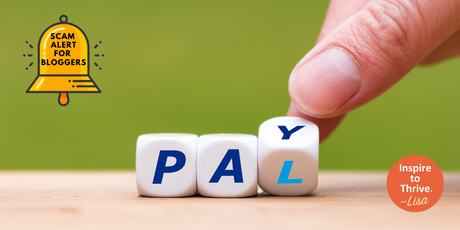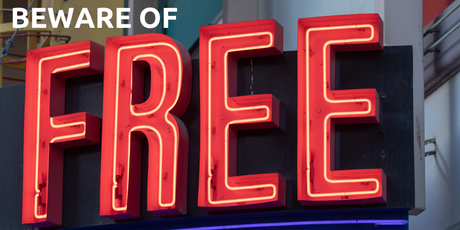How Not to Get Scammed on Paypal
Paypal is the most used payment processor for digital entrepreneurs and bloggers. The reason is that it's most secured and quite simple to use.
However, If you want an online payment gateway with a solid fraud protection policy for your business, I think you should be thinking to give Paypal a try.
Most of the bloggers and social media experts who make money online (with affiliate marketing or selling their own services) get paid through Paypal.

Yes I know Paypal can be very annoying at times. Some merchants have complained of having funds irrationally held. Many countries are yet to be covered by the widely used online payment processor.
Whatever the case, I think they are simply trying to protect people's funds with them and to make sure the system is as most trustworthy as possible.
Like any other Internet based business that's very successful and spoken about everyday, Paypal is not without scammers trying to have a pinch of the huge gateaux.
In my 10+ years of being online as a digital businessman and using Paypal for most of my online transactions (though from a very difficult environment), I have come across two Paypal scam business. So, I'm happy to be sharing this here with Lisa's blogging and social media community.
Paypal is the most used payment processor for digital entrepreneurs and bloggers. The reason is that it's most secured and quite simple to use. #paypal Click To TweetTwo Paypal Scam Businesses Bloggers Should Avoid at All Cost!
The reason I'm writing this here is because I understand that a massive portion of this community uses Paypal to either make or receive payments. If you haven't been a victim, I think anytime soon, you are going to have an encounter with someone motivated by an evil intention.
Read on so that you don't lose money or surrender your account to evil doers.
2 - Paypal Money Adder Scam
This is a cheap and newer scam business targeting naive and somewhat lazy Paypal users who want a quick way to get money sent to their accounts. I have seen beginners in blogging get attracted to this which is a shame to mention.
This fake businesses are going to ask for your valid Paypal account email. They promise to send Free Paypal Money to your account without delay. In order to appear genuine, they will not require your Paypal password. That way, you will feel secured and easily submit your email.

The Paypal Money Adder is a piece of software (Web based on desktop) developed with the main intentions to:
The software versions are even more dangerous because once installed, they may deposit spywares or a piece of app on your computer that runs as a service to monitor and capture your sensitive data to a remote destination.
- Get your account email
- Make money by selling the app
- Try to access your account and do away with your funds
I wrote a post on these Paypal money adder scams with some interesting details on how they function and what they possibly do with your email.
Victims of Paypal Money Adders are always bloggers and people who want to make money online but don't want to invest and establish a sustainable business.
2 - Phishing Scam
They promise to send Free Paypal Money to your account without delay. #paypalscam Click To Tweet" Phishing is the fraudulent attempt to obtain sensitive information such as usernames, passwords and credit card details. It is done by disguising oneself as a trustworthy entity in an electronic communication " - Wikipedia
The second step after the scammers have had your Paypal email address. By using a fake software (or any other means) is generally a Phishing scheme.
You'll soon start receiving emails from these scammers asking you to login to your Paypal account and change your password.
If you are not careful, you may become a victim. The reason is that the emails you get sent are a clean copy of similar mails from Paypal.
Here are Few Tips to Help You Identify Paypal Phishing Emails:
The second step after the scammers have had your Paypal email address. By using a fake software (or any other means) is generally a Phishing scheme. #paypalscam Click To TweetNow, you should never submit your Paypal login data to any website whose domain name is not the official Paypal domain.
- Check the Reply-to email: Note that the From email address is often a valid Paypal email. But these scammers know how we are quick at clicking on the reply button. What they do is carefully placed a disguised email address in the Reply-to field. This is where your replies (which is generally sensitive data) sent to. If the Reply-to email is not attached to a valid Paypal domain name, don't even reply.
- Check the domain name: Sometimes, the scammers will ask you to click on a link and fill a form. Once you click the link from the email, you will be taken to a fake Paypal website. Generally, the design is going to be 100% Paypal website design. This is not something that's hard to clone. But looking at the domain name in your address bar, you are going to see something similar to Paypal.com but with crazy differences. You may find something like paypal.comi.com. This is actually a sub-domain on the domain comi.com.
What if You Already Lost Money to These Scammers?
If the Reply-to email is not attached to a valid Paypal domain name, don't even reply. #avoidpaypalscam Click To TweetOne of the most exciting things about Paypal for merchants is their seller protection policy. If you think that a transaction is unauthorized, just submit a refund and decline it.
Hence, as the scammers won't be able to provide any solid proof of business with you, your money will be refunded. Make sure your refund request is done within 60 days.
In Conclusion of Paypal Scams
One of the most exciting things about Paypal for merchants is their seller protection policy. #paypal Click To TweetI'm happy to have shared this here with you. If you've had any experiences with these bad business models (Or you just want to add to it), drop a comment let me know.
Lastly, kindly share on social media to get the word out.


